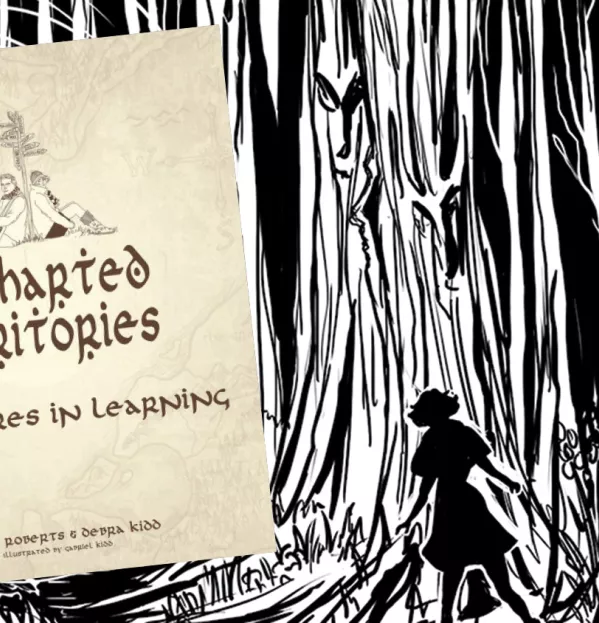Book review: Uncharted Territories: Adventures in Learning

Presented as “a guidebook” around the territory of learning, Uncharted Territories deploys the metaphor throughout. Chapter headings contain references to “primary landmarks”, “stopovers”, “secondary landmarks” and “stepping stones”.
To read it, you need to leave your cynic’s hat at the door. The idealism and open-endedness of this book will probably get on some people’s nerves. Debra Kidd describes herself on her blog as “a travelling pedlar of hope and promise”, while Hywel Roberts is heralded as “a world leader in enthusiasm” who has published one book with “Oops!” in the title and another featuring “Imagineering!”
If that kind of language makes your skin crawl, this book is not for you. But, siding with the enthusiastic and open-minded over the cynical sneer of cold command, puppyishly I bounded into Uncharted Territories feeling game for an adventure with a fun, perhaps slightly hippyish, duo primed to cock a snook at the trads.
Alongside a bibliography featuring an impressive range of writers and researchers from across the educational spectrum, physicist Brian Cox is quoted: “Certainty is not something to be valued - it is the road back to the caves.” This is often how I feel; I distrust the assertive certainty of some education writers just as much, if not more, than the vague, feelgood wafflers.
We don’t have to wait long before some sacred cows are milked, albeit gently: Kidd and Roberts’ statement of intent at the outset references that Matthew Arnold quote beloved of former education secretary Michael Gove and many others: “Teaching children the best that has been thought and said only takes us so far.”
The premise is that by using knowledge as one of our “bedrocks”, we can inspire children to surpass past thinking and writing. How? Through “an unabashed call to arms for the imagination”, summarised in the foreword as the holy trinity of “inform, engage and inspire”.
Now, I’m all for an extended metaphor, and love picture books and an illustrative prompt, but I found the structure of the book tricky. Each chapter opens with a picture and a series of open questions, followed by suggested activities for different key stages and disciplines, and finishing on the “bedrock”.
Maybe I am too institutionalised in my thinking, but I kept skipping to the bedrock sections to work out what underpinned the activities and identify the underlying logic or learning outcomes of these suggested activities. Before I could trust in the hows, I wanted to know the whys.
Energy and imagination
Kidd and Roberts confront the key issues facing the profession with energy and imagination. Most teachers recognise that the system can encourage teaching to the test and a narrow focus on exam success. Schools can become so bogged down in government or exam-board requirements that, surrounded by stressed teachers and students, it becomes hard (to borrow the forest metaphor from the first chapter) to see the wood for the trees. It is also hard at some points to see the wood for the cheese; most of my friends find me irritatingly upbeat but even for me, the enthusiasm in Uncharted Territories at times gets a bit much. Phrases such as “warriors of wonder, let’s begin”, “Sherpas of the curriculum” and “they are not knowledge organisers or schemes of work; they are inspirational tickles” become a little grating.
The authors offer a wide range of exploratory and creative cross-curricular, cross-phase activities. These may initially seem more suitable for primary and KS3, but can offer inspiration for other key stages. There are ideas to cherry-pick for secondary English, but focusing on KS4 and KS5, my primary obstacle is curriculum time and opportunity cost.
If we include more of Kidd and Roberts’ desirable activities, what do we lose? There is a huge quantity of content to cover in the new GCSEs. Not every student comes to secondary school with basic literacy or even the ability to speak English. While some students already have the bedrock of literacy and cultural capital, others need to learn how to read and write, focus on technical accuracy or fill in vocabulary and general knowledge gaps first. This can leave us with less freedom than we would like for playful exploration.
Approached with an open mind, this book could be a bold template for whole-school planning, offering opportunities to explore conceptual links between curriculum areas; a book to dip into for refreshment and inspiration; a place to borrow ideas to link into existing schemes of work; or a springboard for planning.
I’m afraid some people will read it and think like my somewhat traditional mum when I summarised the book for her: “There’s no point prancing about the forest pretending to be a fairy if you don’t know how to spell ‘forest’…Or ‘fairy’.”
I guess it depends if you want a world of happy fairies or good spellers. Ideally, I’d like both.
Stephanie Keenan is curriculum leader for English and literacy at Ruislip High School in London. She blogs at mskeenanlearns.wordpress.com and tweets @stephanootis
You need a Tes subscription to read this article
Subscribe now to read this article and get other subscriber-only content:
- Unlimited access to all Tes magazine content
- Exclusive subscriber-only stories
- Award-winning email newsletters
Already a subscriber? Log in
You need a subscription to read this article
Subscribe now to read this article and get other subscriber-only content, including:
- Unlimited access to all Tes magazine content
- Exclusive subscriber-only stories
- Award-winning email newsletters